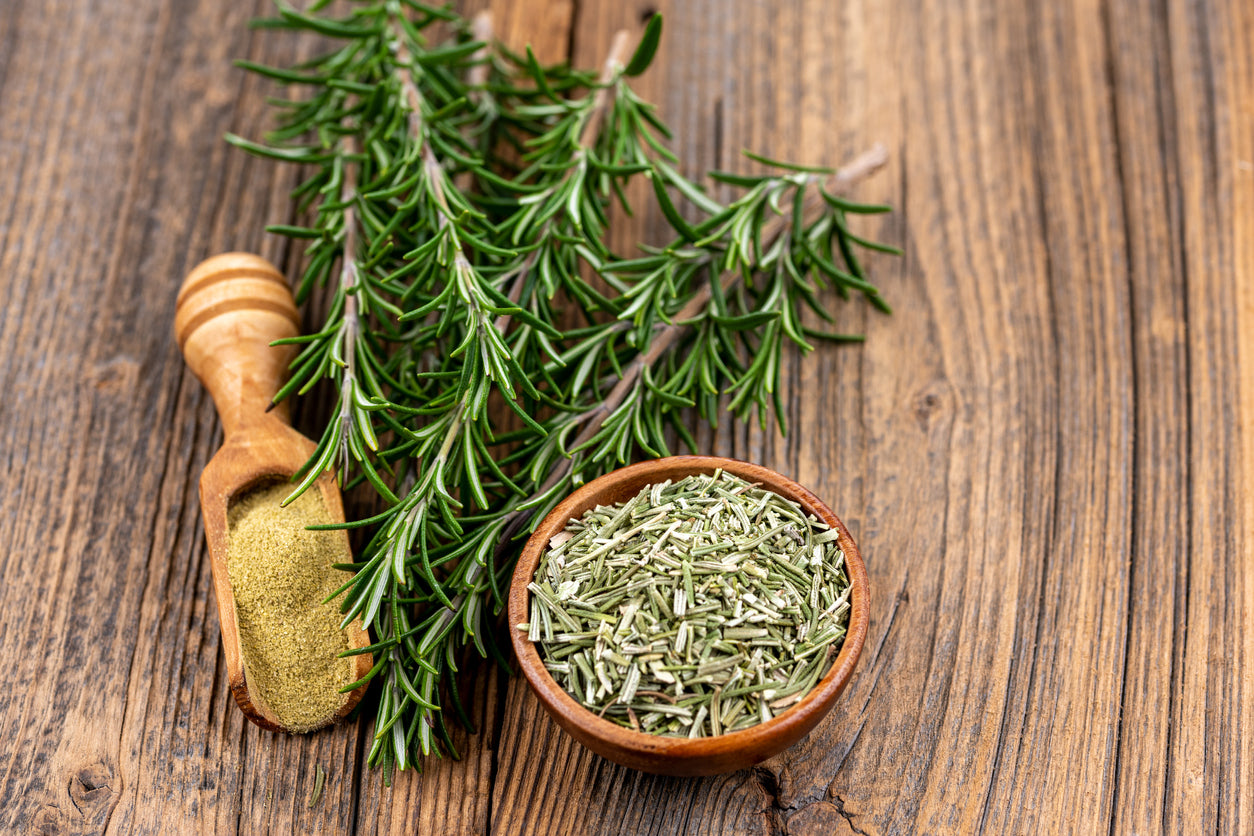Boost your brain power with rosemary

This aromatic Mediterranean herb is beloved by chefs for its ability to impart its distinctive, woodsy flavor to recipes. But rosemary - with antioxidant, anti-inflammatory, and antibacterial properties - also has a history of medicinal use dating back many centuries, with herbal healers advising it to treat liver disease, ease digestive problems, relieve bloating, banish body odor, and even improve vision.
Rosemary has long been believed to have the power to improve memory and sharpen cognitive abilities. In fact, William Shakespeare himself linked it with remembrance. But does scientific research support its brainpower-boosting reputation? Let's take a closer look.
Bittersweet history: Rosemary is traditionally associated with faithful remembrance
The use of rosemary to aid memory and learning dates back to ancient Greece, when aspiring scholars nibbled on rosemary sprigs to help them ace exams. To double their odds of success, some students wore rosemary garlands on their heads.
In medieval times, rosemary was commonly used at funerals, solemnly thrown into the grave before the lowering of the coffin. To this day, rosemary may also be planted on or near European graves to remember loved ones.
In addition, rosemary oil is believed to promote thicker hair growth, and natural beauty experts swear by it as a natural rinse that can enhance and enrich hair color - particularly for dark-haired beauties. (Blondes, on the other hand, are usually advised to add glow with a chamomile or lemon rinse).
As you can see, this fragrant little herb has a long and colorful history. But can it really support brain health and improve cognition?
According to recent studies, the answer seems to be "yes."
Discover how antioxidant-rich rosemary benefits can help your brain
Rosemary, botanically known as Rosmarinus officinalis, is rich in carnosic acid, which may protect the brain from neurodegenerative disease by fighting oxidative damage caused by free radicals.
Another "secret weapon" in rosemary is its high content of a volatile organic compound known as 1,8-cineole, which can comprise up to 45 percent of rosemary oil's volume. Cineole also occurs in cinnamon and rosemary's "cousins" oregano, basil, and thyme.
Researchers find that cineole helps prevent acetylcholine breakdown, a neurotransmitter essential for learning and memory. Scientists say that cineole acts on the brain in much the same way as current pharmaceutical interventions intended to treat dementia!
Also, cineole may potentiate the antioxidant effects of other beneficial ingredients in rosemary, including rosmarinic and ursolic acids. There is some evidence, as well, that rosemary oil aromatherapy lowers levels of cortisol, the "stress" hormone, leading to a sense of relaxation.
Rosemary delivers measurable results
In a study published in the Journal of Medicinal Food, researchers examined the effects of varying amounts of dried rosemary on the cognitive performance of elderly volunteers. The team was particularly interested in measuring the "speed of memory," which is highly useful in predicting cognitive function during aging.
The rosemary group experienced significant benefits involving memory and cognition compared to those who had taken placebo.
Interestingly, the team found that the lowest dosage of rosemary (750 mg - about two-thirds of a teaspoon) improved memory speed more than the highest dose - a whopping 6,000 mg. In fact, this large dose actually caused significant impairments in memory speed.
According to this study, a little rosemary can "go a long way."
A separate study, conducted by British researchers at Northumbria University and published in Therapeutic Advances in Psychopharmacology, examined the effects on healthy young adults of inhaling the aroma of cineole-rich rosemary oil.
Again, rosemary was linked with better performance.
The team noted that a higher concentration of cineole in the blood was associated with improvements in speed and outcome on cognitive tests measuring working memory, executive function, and sustained attention.
Other research has shown that twice-daily aromatherapy sessions using rosemary, orange, lemon, and lavender essential oils were linked with improvements in cognitive function in dementia patients.
The BIG question: How can I access rosemary's benefits?
The most obvious use of rosemary, of course, is in recipes. You can sprinkle it on chicken, salmon, and beef, toss it with roasted potatoes, or use it as a key ingredient in the classic Italian bread, focaccia.
But, if you want to avoid animal, potatoes, and flour products, you can also make rosemary tea by adding six tablespoons of fresh or dried rosemary to a quart of boiling water, steeping for 30 minutes, straining, and cooling.
Natural health experts advise sipping up to three cups of rosemary tea a day to promote sharper memory. As the tea has a pleasant - but somewhat bracing - flavor, you may want to sweeten it somewhat with honey or stevia.
In addition, you can inhale the fragrance of rosemary essential oil via an aromatherapy diffuser - or mix two or three drops with a half teaspoon of olive oil and massage it into the skin.
Like many other essential oils, rosemary essential oil is not to be taken internally.
While rosemary consumed in amounts normally found in food is generally recognized as safe, check with your holistic doctor before trying rosemary essential oil through aromatherapy or massage.
To "rev up" a flagging memory, sharpen foggy thinking - or simply spice up a recipe - give rosemary a try. More than likely, it's right there in your spice rack.
Sources for this article include:






